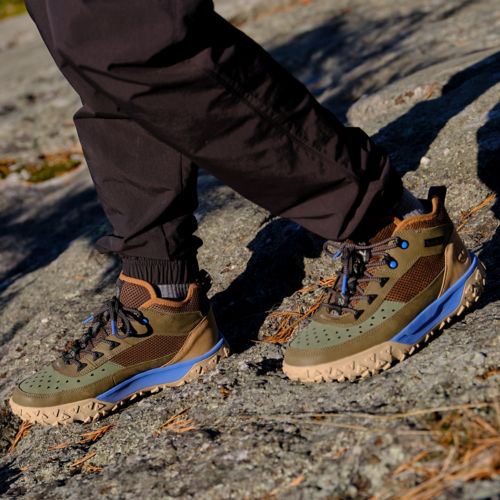
The programme is being implemented through a partnership with Terra Genesis, a regenerative design and development firm connecting brands with growers, and will see VF Corp release new product collections this year through three of its brands.
‘Regenerative agriculture’ encompasses a variety of environmentally and socially conscious practices, which aim to help support biodiversity, enhance water cycles, improve soil health and sequester carbon. This approach not only changes growing practices and helps improve the lives of farmers, it helps replenish and strengthen the soil, plants and the surrounding nature.
“As part of our Science Based Targets roadmap, our vision is that our top nine materials shall originate from regenerative, responsibly sourced renewable, or recycled sources. While transitioning to regenerative is a continual process, the farms we’re working with are already realising the positive benefits, and will ultimately help us achieve this goal,” says Jeannie Renné Malone, the company’s vice president of global sustainability. “We’re proud to work with Terra Genesis and this grower community, which is continually refining their farming practices to reduce their impact on our planet.”
Terra Genesis has developed the first of its kind Regenerative Outcome Verified – ROV rubber supply system. Following a three-year pilot programme sponsored by VF, Terra Genesis collaborated with a network of farming communities in Thailand to scale up the production of regeneratively sourced natural rubber for use within VF’s supply chain. Examples of VF brands that are currently taking advantage of this new sustainable rubber are as follows:
On 2 February, Timberland launched its first product featuring regeneratively grown natural rubber – the Greenstride Motion 6 Hiker. Designed for six ways of motion, the boot features Greenstride comfort soles – balancing performance and function with four-way traction, comfort and breathability, and outsoles made with 55% regeneratively grown rubber. In late March, as part of its 50th Anniversary activations, the brand featured regeneratively grown natural rubber in the Timberland x Edison Chen Future73 TimberloopÔ 6-Inch Boot, which also includes outsoles made with 55% regeneratively grown rubber. Mentioned are just two of more than 120 styles that will utilise regenerative rubber in 2023 from Timberland.
“We began our regenerative sourcing journey in 2020 with leather, followed by cotton in 2021. We’re incredibly excited to expand into rubber, one of our top materials,” said Meredith Lipnick, senior manager of environmental stewardship for Timberland. “The work Terra Genesis is doing is critical, in terms of not only environmental benefits, but also supporting the farmers who are so passionate about their land, livelihoods and communities.”

US Tariffs are shifting - will you react or anticipate?
Don’t let policy changes catch you off guard. Stay proactive with real-time data and expert analysis.
By GlobalDataVans is utilising regeneratively grown natural rubber in its Circle Vee silhouette, the cornerstone of the brand’s new Surf VR3 Collection, which launched on 1 March. All of the rubber used to make the Circle Vee’s VR3Waffle outsole (60% of the compound) is regeneratively grown natural rubber. In addition, this season Vans will utilise regenerative rubber in the VR3Waffle outsole across an even broader VR3 collection of approximately 80 SKUs and more than 500k pairs of shoes.
“The responsibility we have to protect the environment for future generations is critical,” said Alyse Russel, senior manager of sustainability at Vans. “And by sourcing regeneratively grown natural rubber, we are supporting farming practices that aim to restore natural forests and create thriving, biodiverse ecosystems. By incorporating sustainably conscious product innovation into our designs, such as our VR3Waffle outsole, we are helping to enhance water cycles, improve soil health and sequester carbon from the atmosphere.”
The Vans team is working to educate their consumers about the benefits of regenerative rubber by launching a series of Instagram videos.
In autumn 2023, The North Face will launch its first footwear products containing rubber from these diversified rubber farms. The rubber will be incorporated into most of the brand’s Surface CTRL outsoles, making up 10% of the outsole in all but three shoe models that use them, including popular styles such as the Back-to-Berkeley boot, Hedgehog hiking boots and new Summit VECTIV Pro.
“Through our relationship with Terra Genesis, we are able to help support farming systems that can provide biodiversity benefits and promote increased soil health. Additionally, we can utilise this rubber in our Surface CTRL outsoles without compromising the traction performance on demanding terrains,” said Carol Shu, senior manager of global sustainability for The North Face. “We believe using regeneratively grown materials in our products can help to move the retail industry beyond just ‘doing less bad’ into a space of having a more positive impact on nature and resources.”
Rubber is just one of the materials already on its way to becoming sourced from farms or ranches using regenerative agriculture practices. VF Corp also has pilot programmes underway to work towards regeneratively-cultivated wool, cotton and leather. In the meantime, the company says it will continue to explore opportunities with suppliers who are honing their sustainable agricultural practices.
To help assess regenerative agriculture programmes and their participating producers, VF Corp is creating a Regenerative Framework of Guidelines with the help of consultant, Pure Strategies, covering a variety of farming practices, including those around rubber as a part of tree crop and agroforestry.
By creating relationships with farmers, ranchers, and growers that are on the road to achieving regenerative practices and verified outcomes, VF says it is working to build sustainable supply chains that will benefit the apparel and footwear industry and beyond. This effort is consistent with the company’s mission to promote sustainable lifestyles for the betterment of people and the planet.



